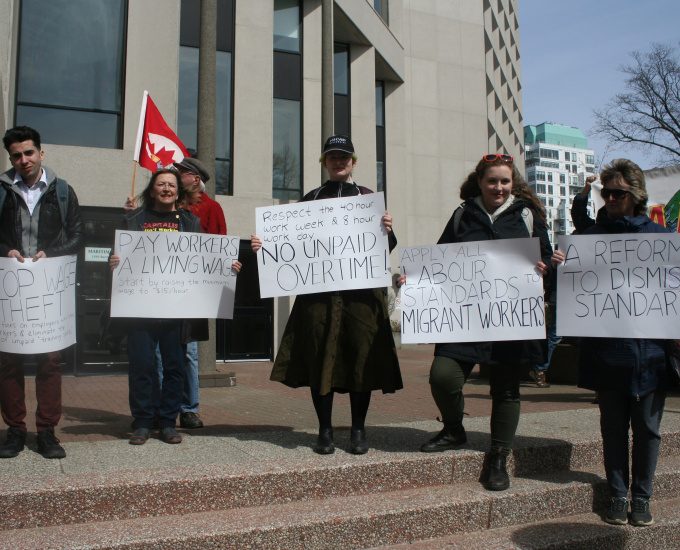
This article was first published in the excellent RandkandFile.ca. Republished with the kind permission of RankandFile and the author
KJIPUKTUK (Halifax) – In August, the Canadian Centre for Policy Alternatives (CCPA) released their report “A Rising Tide to Lift All Boats”, making several recommendations to improve existing employment legislation in Nova Scotia. This 2019 report is a follow-up to the 2012 CCPA report, and provides and updated and in-depth critique of the laws currently governing employment relationships in the province.
See also: Nova Scotia labour standards not keeping pace, report suggests
Rebecca Casey, the author of the report and Assistant Professor in the Department of Sociology at Acadia University, positions Nova Scotia’s labour standards within a national context, and points out several ways in which Nova Scotia has fallen behind. She states that the current labour legislation is insufficient and is failing to address the current needs of workers in the province.
Provisions pertaining to standard hours of work, overtime pay, vacation, minimum wage, and statutory holidays, Casey argues are especially weak. With entitlement to over-time pay beginning at 48-hours, Nova Scotia has one of the longest workweeks in the country. Access to vacation time and statutory holidays are below average when compared with other jurisdictions. While Nova Scotia is one of the few provinces with gender pay-equity legislation, no legislation exists to prohibit wage discrimination on the grounds of employment status. This means that employers can legally pay full-time and part-time workers differently for the same job.
Low wages
A topic of great controversy is Nova Scotia’s minimum wage, which is the 5th lowest in Canada. At an hourly rate of $11.04 for inexperienced workers (workers employed for less than 3 months with an employer), and $11.55 for experienced workers, minimum wage earners are making almost $8 less than a living wage for the city of Halifax.

Casey notes that several professions and industries fall beyond the scope of Nova Scotia’s employment legislation, meaning that many are denied the few and basic protections enjoyed by other workers in the province. This is especially concerning given the rise of precarious employment, which Casey defines as work with “high levels of uncertainty, low income, a lack of control over the labour process, and limited access to regulatory protections”.
Precarious work
Temporary, seasonal, and contract jobs, for example, often defy standard employment, and render workers insufficiently protected. The frequent misclassification of workers as independent contractors is also concerning to Casey, as independent contractor status can exempt workers from receiving overtime pay, vacation time, workers compensation, and a minimum wage. The rise in precarious employment means that a growing portion of the workforce is reliant on improvements to labour standards legislation, which currently overlooks these employment trends. Women, racial and ethnic minorities, and immigrants are especially vulnerable to the rise in precarious work, making this subject especially pressing.
Those who oppose stronger labour protections often make bleak predictions about job losses, business closures, and economic downturns. Casey supports her recommendations, not only by appealing to workers, but to employers and the business community as well. She argues that improved working conditions create more committed employees and decrease employee turnover.
Shortened workweeks and longer rest periods are associated with decreases in workplace injuries and deaths. By offering time to recharge, vacations and statutory holidays can improve a workers mental and physical health, and thereby increase job productivity. Improved worker health can also mean less strain on employers who offer health-care benefits.
High standards means better economy
From an economic standpoint, Casey explains that minimum wage increases circulate back into the local economy as low-income households increase their spending. This creates more jobs and improves business profitability overall. Improvements the Labour Standards Code will also make jobs more enticing, Casey argues, and will allow Nova Scotia to both attract and maintain a strong workforce.
Casey’s report draws attention to Nova Scotia’s shortcomings when it comes to the treatment of its workers. “It exposes just how far behind Nova Scotia really is.” says Jason Edwards, Labour Lawyer and organizing member of the Halifax Workers’ Action Centre. “If we want our laws to keep up with the modern labour market, the province needs to conduct a comprehensive and independent review of its employment standards legislation.”
Pushes made by workers and labour campaigns, such as the nation-wide $15 & Fairness campaign, have led to changes to labour legislation in Alberta, British Columbia, and Ontario, as well as in the federal government. Workers in Nova Scotia have a long history of demanding, and achieving, improvements to their labour standards. This practice must both continue and adapt to suit the current and changing needs of workers in the province.
See also: Your rights at work: The boss can take your tips!
With a special thanks to our generous donors who make publication of the Nova Scotia Advocate possible.
Subscribe to the Nova Scotia Advocate weekly digest and never miss an article again. It’s free!



